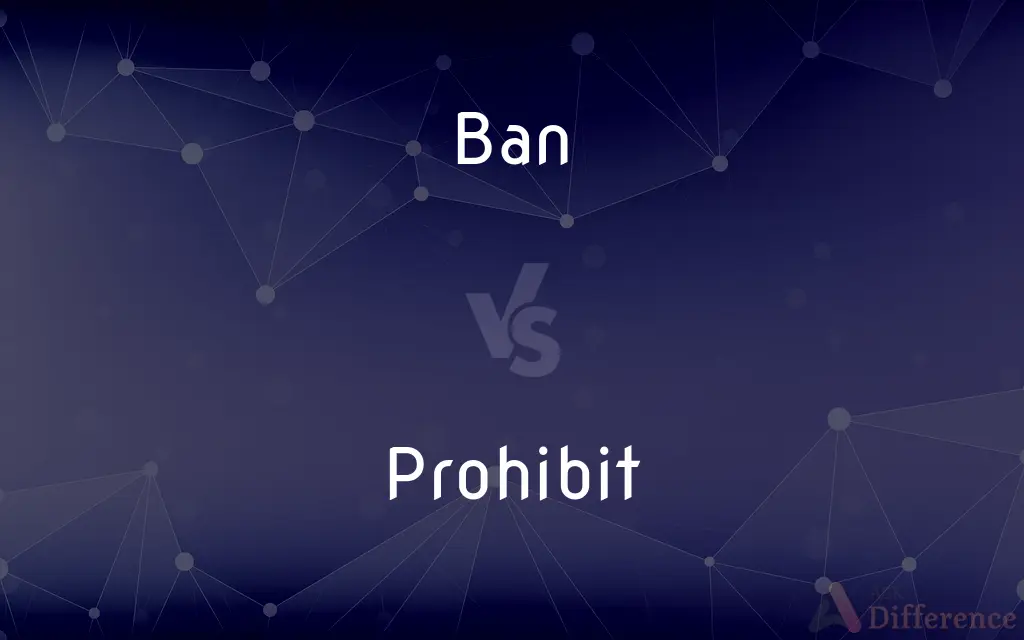Ban vs. Prohibit — What's the Difference?
Edited by Tayyaba Rehman — By Fiza Rafique — Updated on March 16, 2024
"Ban" implies a formal or official prohibition, often with legal implications, while "prohibit" is more general, denoting to forbid by authority or rule.

Difference Between Ban and Prohibit
Table of Contents
ADVERTISEMENT
Key Differences
"Banning" usually refers to an official or formal action, often backed by law, that disallows something, such as banning a substance or activity. It carries a sense of permanence or long-term enforcement, often applied in a public or institutional context. "Prohibiting," on the other hand, is a broader term that means to forbid or disallow, which can be applied in various contexts, from legal to personal settings. It can be temporary or situational, depending on the authority imposing it.
The context in which "ban" and "prohibit" are used often reflects the level of formality and the scope of enforcement. A ban is typically declared by governments, institutions, or organizations and is often public and widely communicated. Prohibitions, however, can range from formal legal restrictions to informal or private directives, such as a parent prohibiting a child from certain activities.
The consequences of a ban can be more severe, often involving penalties, fines, or other legal actions. In contrast, the consequences of prohibition can vary widely depending on the context and the authority of the person or entity imposing the prohibition, ranging from legal repercussions to personal or social disapproval.
Despite these differences, "ban" and "prohibit" are sometimes used interchangeably in everyday language, particularly in informal contexts or when the distinction between the formality and scope of the enforcement is not significant.
Comparison Chart
Formality
Typically more formal, often involves laws
Can be formal or informal
ADVERTISEMENT
Authority
Usually imposed by governments or institutions
Can be imposed by anyone with authority
Scope
Often broad, affecting many people
Can be broad or narrow, depending on context
Consequences
Generally involves penalties or legal actions
Varies widely, from legal action to disapproval
Duration
Often long-term or permanent
Can be temporary or permanent
Compare with Definitions
Ban
An official or legal prohibition against something.
The city council issued a ban on smoking in public parks.
Prohibit
To formally forbid something by law, rule, or other authority.
The school prohibits the use of cell phones in class.
Ban
A ban can also refer to a formal edict or decree forbidding something.
The government's ban on certain chemicals took effect immediately.
Prohibit
Prohibit can mean to prevent or hinder an action.
Safety regulations prohibit working in hazardous conditions without proper gear.
Ban
Bans are often used in international contexts, like trade bans between countries.
The trade ban affected several industries across both nations.
Prohibit
Prohibit might also be used in personal or social contexts, not just legal ones.
My doctor prohibits me from consuming any dairy products.
Ban
In sports and other competitions, a ban might prevent someone from participating.
The athlete faced a year-long ban due to doping violations.
Prohibit
In a broader sense, prohibit can mean to make impossible or impractical.
The small size of the apartment prohibits large gatherings.
Ban
A ban can extend to the exclusion of certain individuals from entering a place.
The bar issued a ban against the unruly customer.
Prohibit
The term can apply to abstract concepts, like ideas or behaviors, not just physical actions.
Company policy prohibits discrimination of any kind.
Ban
To prohibit (an action) or forbid the use of (something), especially by official decree
Banned smoking in theaters.
Banned pesticides in parks.
Prohibit
To forbid by authority
Smoking is prohibited in most theaters.
Ban
To refuse to allow (someone) to do something, go somewhere, or be a participant; exclude
A coach who was banned from the sidelines for two games.
A gambler who was banned from the club.
Prohibit
To prevent; preclude
Modesty prohibits me from saying what happened.
Ban
South African Under the former system of apartheid, to deprive (a person suspected of illegal activity) of the right of free movement and association with others.
Prohibit
(transitive) To forbid, disallow, or proscribe officially; to make illegal or illicit.
The restaurant prohibits smoking on the patio.
Ban
(Archaic) To curse.
Prohibit
To forbid by authority; to interdict; as, God prohibited Adam from eating of the fruit of a certain tree; we prohibit a person from doing a thing, and also the doing of the thing; as, the law prohibits men from stealing, or it prohibits stealing.
Ban
A prohibition imposed by law or official decree
A ban on cigarette smoking on airplanes.
Prohibit
To hinder; to debar; to prevent; to preclude.
Gates of burning adamant,Barred over us, prohibit all egress.
Ban
An excommunication or condemnation by church officials.
Prohibit
Command against;
I forbid you to call me late at night
Mother vetoed the trip to the chocolate store
Ban
Censure, condemnation, or disapproval expressed especially by public opinion.
Ban
A summons to arms in feudal times.
Ban
(Archaic) A curse; an imprecation.
Ban
A unit of currency equal to 1/100 of the primary unit of currency in Romania and Moldova.
Ban
To summon; to call out.
Ban
(transitive) To anathematize; to pronounce an ecclesiastical curse upon; to place under a ban.
Ban
(transitive) To curse; to execrate.
Ban
(transitive) To prohibit; to interdict; to proscribe; to forbid or block from participation.
Bare feet are banned in this establishment.
Ban
(ambitransitive) To curse; to utter curses or maledictions.
Ban
Prohibition.
Ban
A public proclamation or edict; a summons by public proclamation. Chiefly, in early use, a summons to arms.
Bans is common and ordinary amongst the Feudists, and signifies a proclamation, or any public notice.
Ban
The gathering of the (French) king's vassals for war; the whole body of vassals so assembled, or liable to be summoned; originally, the same as arrière-ban: in the 16th c., French usage created a distinction between ban and arrière-ban, for which see the latter word.
He has sent abroad to assemble his ban and arriere ban.
The Ban and the Arrierban are met armed in the field to choose a king.
France was at such a Pinch..that they call'd their Ban and Arriere Ban, the assembling whereof had been long discussed, and in a manner antiquated.
The ban was sometimes convoked, that is, the possessors of the fiefs were called upon for military services.
The act of calling together the vassals in armed array, was entitled ‘convoking the ban.
Ban
(obsolete) A curse or anathema.
Ban
A pecuniary mulct or penalty laid upon a delinquent for offending against a ban, such as a mulct paid to a bishop by one guilty of sacrilege or other crimes.
Ban
A subdivision of currency, equal to one hundredth of a Romanian leu.
Ban
A subdivision of currency, equal to one hundredth of a Moldovan leu.
Ban
A unit measuring information or entropy based on base-ten logarithms, rather than the base-two logarithms that define the bit.
Ban
A title used in several states in central and south-eastern Europe between the 7th century and the 20th century.
Ban
A kind of fine muslin, made in the East Indies from the fiber of the banana leaf stalks.
Ban
A public proclamation or edict; a public order or notice, mandatory or prohibitory; a summons by public proclamation.
Ban
A calling together of the king's (esp. the French king's) vassals for military service; also, the body of vassals thus assembled or summoned. In present usage, in France and Prussia, the most effective part of the population liable to military duty and not in the standing army.
Ban
Notice of a proposed marriage, proclaimed in church. See Banns (the common spelling in this sense).
Ban
An interdiction, prohibition, or proscription.
Ban
A curse or anathema.
Ban
A pecuniary mulct or penalty laid upon a delinquent for offending against a ban; as, a mulct paid to a bishop by one guilty of sacrilege or other crimes.
Ban
An ancient title of the warden of the eastern marches of Hungary; now, a title of the viceroy of Croatia and Slavonia.
Ban
To curse; to invoke evil upon.
Ban
To forbid; to interdict.
Ban
To curse; to swear.
Ban
A decree that prohibits something
Ban
100 bani equal 1 leu
Ban
100 bani equal 1 leu
Ban
An official prohibition or edict against something
Ban
A bachelor's degree in nursing
Ban
Prohibit especially by legal means or social pressure;
Smoking is banned in this building
Ban
Forbid the public distribution of ( a movie or a newspaper)
Ban
Ban from a place of residence, as for punishment
Ban
Expel from a community or group
Common Curiosities
Is "prohibit" always a legal term?
No, "prohibit" can be used in both legal and non-legal contexts to indicate forbiddance.
Are there areas where only a ban is appropriate to use, not a prohibition?
"Ban" is often preferred in contexts involving formal legal decisions or wide-reaching public policies.
Are prohibitions always negative?
While prohibitions restrict certain actions, they can have positive intentions, such as protecting individuals or the environment.
Can a ban exist without an official announcement?
Typically, a ban is formally announced, especially if it's from a government or large institution.
Are all prohibitions legal in nature?
No, some prohibitions are based on social norms or personal preferences.
Can a ban and a prohibition have the same legal standing?
Yes, both can be legally binding, but bans are typically more formal and widely enforced.
Can a prohibition be temporary?
Yes, prohibitions can be either temporary or permanent, depending on the context.
Is it possible for an individual to "ban" something, or is this term reserved for institutions?
While "ban" is more commonly used by institutions, individuals can use it in a more informal sense.
Can a prohibition lead to a ban?
Yes, initial prohibitions can sometimes escalate into more formal bans if the situation warrants.
How do international bans work?
International bans, such as trade bans, are enforced through agreements between countries and can have significant political and economic implications.
How do bans and prohibitions impact individual freedoms?
Both can restrict individual freedoms, but they are usually implemented with the intention of protecting public health, safety, or welfare.
Can a ban be lifted?
Yes, bans can be lifted or repealed, depending on changes in law, policy, or circumstances.
How do enforcement mechanisms differ between bans and prohibitions?
Enforcement can vary widely, from legal penalties for bans to social or personal consequences for prohibitions.
Is a prohibition less serious than a ban?
Not necessarily; the seriousness depends on the context and the consequences defined by the authority imposing it.
Are bans more common in certain areas than prohibitions?
Bans are more common in regulatory or public policy areas, while prohibitions can be found in a broader range of contexts.
Share Your Discovery

Previous Comparison
Idiom vs. Saying
Next Comparison
Halloween vs. ChristmasAuthor Spotlight
Written by
Fiza RafiqueFiza Rafique is a skilled content writer at AskDifference.com, where she meticulously refines and enhances written pieces. Drawing from her vast editorial expertise, Fiza ensures clarity, accuracy, and precision in every article. Passionate about language, she continually seeks to elevate the quality of content for readers worldwide.
Edited by
Tayyaba RehmanTayyaba Rehman is a distinguished writer, currently serving as a primary contributor to askdifference.com. As a researcher in semantics and etymology, Tayyaba's passion for the complexity of languages and their distinctions has found a perfect home on the platform. Tayyaba delves into the intricacies of language, distinguishing between commonly confused words and phrases, thereby providing clarity for readers worldwide.
















































